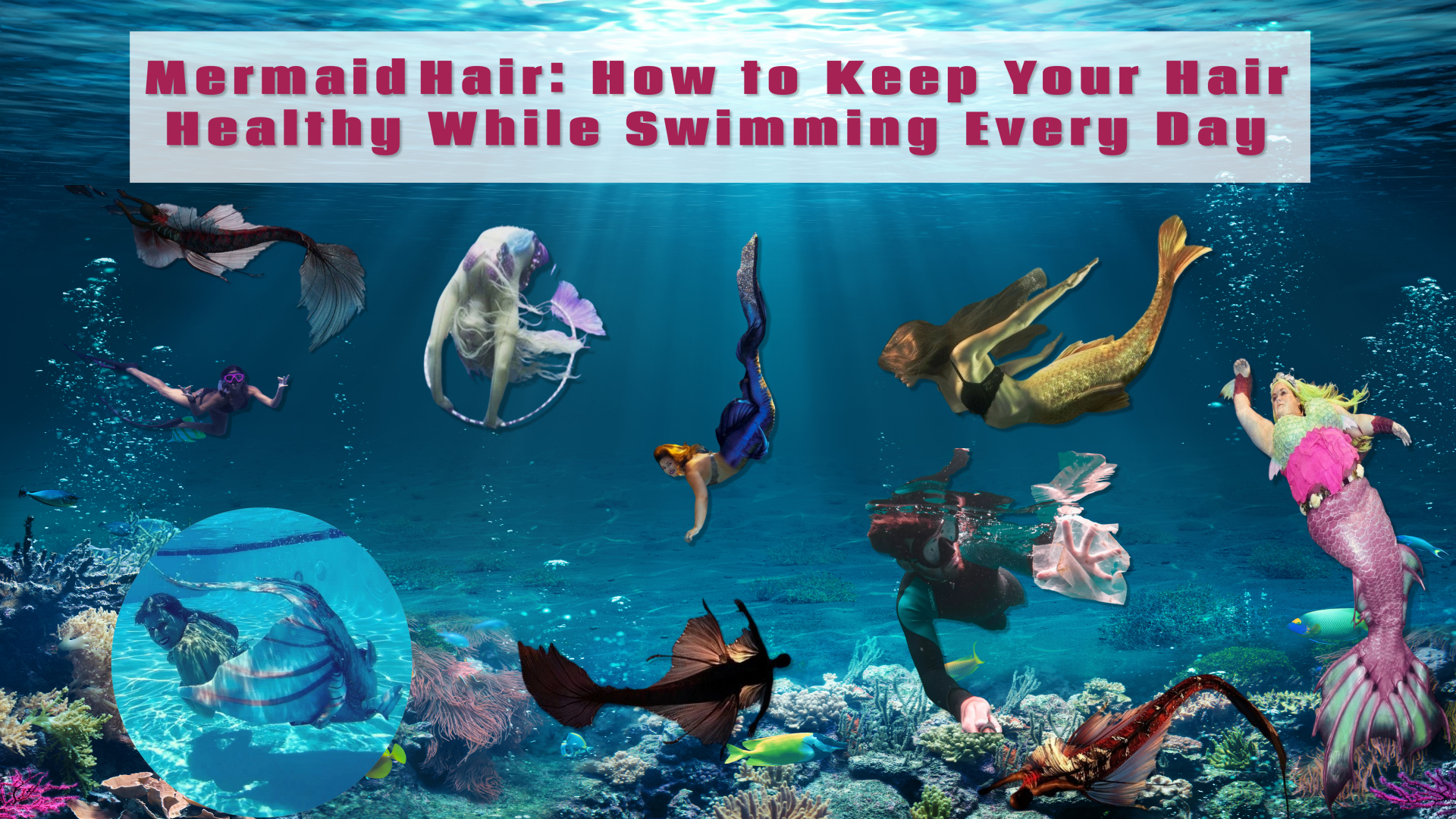
Are you a water lover who can’t resist the allure of swimming every day? Whether you’re diving into the pool or riding the waves in the ocean, there’s something magical about spending time in the water. However, frequent exposure to chlorine and salt water can take a toll on your hair, leaving it dry, brittle, and lackluster. But don’t worry! In this article, we’ll dive into the secrets of maintaining healthy hair while swimming regularly, so you can have the perfect “mermaid hair” without sacrificing its vitality.
Understanding the Impact of Chlorine and Saltwater on Hair
Before we delve into the preventive measures, it’s crucial to understand how chlorine and saltwater affect our hair. Chlorine, commonly found in swimming pools, acts as a disinfectant but also strips away the natural oils from our hair. This leads to dryness, frizz, and even a greenish tint for light-colored hair. On the other hand, saltwater, abundant in the ocean, contains high levels of salt that similarly dehydrate the hair, leaving it brittle and prone to breakage.
Preparing Your Hair Before Swimming
To minimize the damage caused by chlorine and saltwater, it’s important to take some proactive steps before you plunge into the water. Start by thoroughly rinsing your hair with clean water. By saturating your hair with fresh water beforehand, it becomes less likely to absorb chlorine or saltwater. Additionally, consider applying a leave-in conditioner or oil to create a protective barrier, preventing the harsh chemicals from penetrating your hair cuticles.
Wearing a Swim Cap
One of the most effective ways to shield your hair from the damaging effects of chlorine or saltwater is by wearing a swim cap. A swim cap acts as a barrier, keeping your hair relatively dry and minimizing the exposure to harsh chemicals. When choosing a swim cap, opt for one made of silicone or latex, as they provide a snug fit. Before putting on the swim cap, ensure your hair is secured in a bun or braid to prevent any discomfort.
Wetting Your Hair with Fresh Water
Another crucial step in protecting your hair while swimming is to wet it with fresh water before diving in. Wet hair is less porous, meaning it absorbs less chlorine or saltwater compared to dry hair. By thoroughly wetting your hair with fresh water, you create a barrier that helps minimize the absorption of harmful chemicals, thus reducing the potential damage caused to your hair.
Applying a Protective Hair Product
Using a specially formulated protective hair product designed for swimming can significantly enhance the health of your hair. Look for products that are waterproof and contain ingredients such as keratin or silicone that act as a shield against chlorine and saltwater. Additionally, choose products that offer UV protection to safeguard your hair from the harmful effects of the sun’s rays, which can further contribute to dryness and brittleness.
Post-Swim Hair Care
Once you’ve had your swimming session, it’s essential to rinse your hair immediately to remove any lingering chlorine or saltwater. By rinsing your hair with clean water, you wash away the harmful chemicals that can continue to damage your hair if left untreated. Consider using a clarifying shampoo once or twice a week to remove any chemical buildup, or opt for natural remedies such as rinsing with apple cider vinegar or a lemon juice solution to restore your hair’s pH balance.
Deep Conditioning Treatments
To counteract the dryness caused by chlorine and saltwater, indulge in deep conditioning treatments regularly. Deep conditioning helps replenish moisture, repair damage, and restore vitality to your hair. You can either opt for professional deep conditioning treatments available at salons or try DIY recipes using natural ingredients such as avocado, coconut oil, or honey. Apply the deep conditioner generously to your hair, leave it on for the recommended duration, and then rinse thoroughly.
Avoiding Heat Styling and Overwashing
Excessive heat styling and frequent washing can exacerbate the damage caused by swimming. Heat styling tools such as blow dryers, straighteners, and curling irons can further dehydrate your hair, leading to increased frizz and brittleness. Instead, embrace your natural hair texture or opt for heatless styling methods like braids or updos. Furthermore, refrain from overwashing your hair, as this strips away the natural oils that help keep it moisturized. Instead, aim for a balance and consider using dry shampoo between washes to maintain freshness.
Protecting Hair from the Sun
While enjoying the sun’s warmth, it’s crucial to protect your hair from the harmful UV rays. Prolonged sun exposure can lead to hair damage, including dryness, color fading, and increased brittleness. Whenever possible, wear hats or scarves to shield your hair from direct sunlight. Additionally, apply a hair sunscreen product or use a leave-in conditioner with UV protection to create an extra layer of defense against the sun’s harmful rays.
Healthy Diet and Hydration
Maintaining healthy hair starts from within, so make sure you nourish your body with a balanced diet and stay hydrated. A diet rich in vitamins, minerals, and omega-3 fatty acids promotes hair health. Include foods like salmon, avocados, nuts, and leafy greens in your meals to provide essential nutrients to your hair follicles. Additionally, drink plenty of water to keep your body hydrated, as dehydration can impact the moisture levels of your hair.
Seeking Professional Advice
If you’re struggling to keep your hair healthy despite following the tips mentioned above, consider seeking professional advice. A hairstylist or trichologist can assess the condition of your hair, provide personalized recommendations, and suggest suitable hair treatments for swimmers. They have the expertise to address specific concerns and offer tailored solutions to restore and maintain the health of your hair.
Conclusion
With the right precautions and care, you can enjoy swimming every day without compromising the health of your hair. By following these tips and incorporating them into your routine, you can achieve and maintain beautiful, healthy, and vibrant “mermaid hair.” Remember to rinse before swimming, use protective products, and practice post-swim hair care to minimize damage. Embrace your natural hair, nourish it from within, and seek professional advice when needed. Now, go make a splash with your healthy and stunning mermaid hair!
Frequently Asked Questions (FAQ) – Maintaining Healthy Hair While Swimming
Q: How do chlorine and saltwater affect the hair? A: Chlorine in swimming pools and saltwater in the ocean can strip the natural oils from your hair, leading to dryness, frizz, and even a greenish tint for light-colored hair. They can also make the hair brittle and prone to breakage.
Q: What can I do to protect my hair before swimming? A: Before swimming, thoroughly rinse your hair with clean water to minimize chlorine or saltwater absorption. Apply a leave-in conditioner or oil to create a protective barrier. Wearing a swim cap made of silicone or latex can also provide effective protection.
Q: Should I wet my hair with fresh water before swimming? A: Yes, wetting your hair with fresh water before swimming creates a barrier that reduces the absorption of chlorine or saltwater. It’s an important preventive step to minimize damage.
Q: Are there any protective hair products specifically for swimming? A: Yes, using a protective hair product formulated for swimming can help shield your hair from chlorine and saltwater. Look for waterproof products that contain ingredients like keratin or silicone. UV protection is also beneficial to safeguard your hair from the sun’s harmful rays.
Q: How should I care for my hair after swimming? A: After swimming, rinse your hair immediately with clean water to remove any lingering chlorine or saltwater. Consider using a clarifying shampoo once or twice a week to remove chemical buildup. Deep conditioning treatments are essential to replenish moisture and repair damage caused by swimming.
Q: Should I avoid heat styling and overwashing my hair? A: Excessive heat styling and frequent washing can worsen the damage caused by swimming. Embrace your natural hair texture and limit heat styling. Avoid overwashing to preserve the natural oils that keep your hair moisturized. Dry shampoo can help maintain freshness between washes.
Q: How can I protect my hair from the sun? A: Protect your hair from the sun’s harmful UV rays by wearing hats or scarves whenever possible. Apply a hair sunscreen product or use a leave-in conditioner with UV protection. These measures help prevent dryness, color fading, and increased brittleness.
Q: How important is a healthy diet and hydration for maintaining healthy hair? A: A balanced diet rich in vitamins, minerals, and omega-3 fatty acids promotes hair health. Include foods like salmon, avocados, nuts, and leafy greens in your diet. Stay hydrated by drinking plenty of water as dehydration can affect hair moisture levels.
Q: Should I seek professional advice for hair care? A: If you’re having difficulty maintaining healthy hair despite following preventive measures, consider consulting a hairstylist or trichologist. They can assess your hair’s condition, offer personalized recommendations, and suggest suitable hair treatments for swimmers.
Q: Can I achieve and maintain healthy hair while swimming regularly? A: Yes, by following the tips provided in this article and incorporating them into your routine, you can enjoy swimming without compromising the health of your hair. Practice preventive measures, embrace your natural hair, nourish it from within, and seek professional advice when needed. With proper care, you can have beautiful, healthy, and vibrant “mermaid hair” that shines even after swimming.






